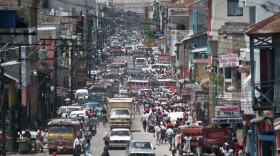WADE GOODWYN, HOST:
Sao Paulo is one of the biggest cities in the world and one of the economic engines of South America. Its center is known for its fancy malls, posh departments and even helicopter landing pads. The outlying areas where the vast majority of the workforce live are known for poverty and crime, less often for poetry and high culture. NPR's Lourdes Garcia-Navarro reports on efforts to change that.
LOURDES GARCIA-NAVARRO, BYLINE: Booze and poetry have a long and honorable tradition that goes back millennia. In ancient Greece, poems would be recited at drinking parties. Here in Sao Paulo's peripheria, or periphery, poetry night is held at a corner bar by necessity, not by choice. And there aren't any marble columns. Located in a shanty town, when we arrive, the bar is so full that people flow out onto the street and sit under streetlamps smoking and holding small glasses of beer, waiting for the event to begin.
SERGIO VAZ: (Through translator) This is a very poor and needy area. We don't have public spaces here like a movie theater or museums. The only public space we have is the bar. So we decided to transform the bar into a cultural center. The idea was to occupy space we have.
GARCIA-NAVARRO: That's Sergio Vaz, the creator of Cooperifa, which sponsors the weekly poetry evenings. The event has been going on now for over a decade, and it's spawned many other satellite evenings in other poor parts of the capital. This bar was Sergio's father's. He grew up here among the tables and the stools. When poetry evening began, he says, people in the neighborhood reacted with skepticism. But slowly it's gained a passionate following.
VAZ: (Through translator) We are at an area where people suffer a lot. Lack of security, lack of health care, lack of education, lack of facilities, lack of culture. So they write things down on paper. We put all that in our writings. Who wants to listen to the poor? Who wants to listen to the needy? Nobody. We are a success because this is a place where people can be heard.
(SOUNDBITE OF POETRY READING)
GARCIA-NAVARRO: The din of the bar talk slowly quiets down. A blind woman who's in her 70s takes to the microphone. She's quickly followed by an 11-year-old girl. Many of those listening are young, in their teens or early 20s. Vaz says some have come to him saying they've been inspired to return to school or go on to higher education because they were moved by the words spoken here. Like poets anywhere, the participants write poems about their hopes, dreams, fears, what they know. Sergio Vaz begins with his poem, which is an homage to Victor Hugo's "Les Miserables." His poem is the story of two men. One was born in poverty. He recites...
VAZ: (Portuguese spoken).
GARCIA-NAVARRO: Being a weed, he never had a spring. He was born without father, mother, horizon or direction. Feet on the ground, never even had a bicycle. The other was born in wealth.
VAZ: (Portuguese spoken).
GARCIA-NAVARRO: He recites, he wasn't born, he premiered. White skin, never had winters. Had a father, mother, school books and even a fairy godmother. The poem goes on to tell how both men became criminals - the poor one a kidnapper, the other a corrupt businessman. The poem ends with a description of the two men's fates.
VAZ: (Portuguese spoken).
GARCIA-NAVARRO: He recites, the one with the gunpowder rots penitent. The one with the pen gets rich unpunished. To one, the only thing remaining is to look for salvation. The other is a presidential candidate.
(APPLAUSE)
GARCIA-NAVARRO: Another poet, Marcio Antonio-Rodriguez (ph), takes to the mic.
MARCIO ANTONIO-RODRIGUEZ: (Portuguese spoken).
GARCIA-NAVARRO: And suddenly, nothing was lacking at the favela, he recites. Sewers, electricity, piped water, sanitation was no longer basic. It was complete. He goes on listing all the things that changed, and the poem ends with it just being a dream and him waking up to the sound of an alarm to head off to the drudgery of work.
(APPLAUSE)
GARCIA-NAVARRO: After he finishes, Rodriguez tells us he comes here because he wants to show that people here can dream.
ANTONIO-RODRIGUEZ: (Through translator) We want to show that there is creativity and art in the periphery, that there are people here who can produce work that people who live on the other side of the bridge could never imagine.
GARCIA-NAVARRO: Some 50 people in all take to the podium, and the listening and the reciting go on late into the night. Lourdes Garcia-Navarro, NPR News, Sao Paulo. Transcript provided by NPR, Copyright NPR.





